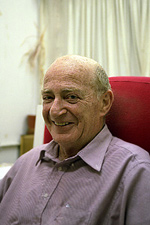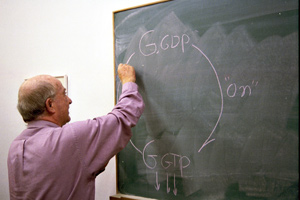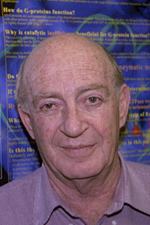Zvi Selinger passed away on September 14, 2008.
Zvi was my mentor. I knew him for more than 15 years,
the majority of which I spent in his lab.
I was half a world away when I heard of his passing,
so I was not at his funeral to say goodbye.
Here I want to commemorate this wonderful man,
who had a tremendous influence on me and my life.
Zvi Selinger was a great scientist - a brilliant scientist -
whose intuition, breadth of knowledge,
and keen intellect shone through every time we talked.
He is best known for his breakthrough discoveries
of the Regulatory GTPase Cycle, the control mechanism for nature's
ubiquitous molecular switches - G-proteins.
Zvi and Dani Cassel, back in the 1970's, were the first to tease
apart the mechanism of how G-proteins really work.
Zvi has told me many a story about these times, and of the difficulties
they had in publishing their groundbreaking papers
(many of which were published in journals that today would be classified
as "low impact journals").
Like many of Zvi's stories, there was a moral here -
as a scientist you have to do everything you can to validate
your results ("controls, controls, controls").
However, Zvi said, once "the story" is there and you know
you did a good job, you need to believe in your work despite harsh criticism.
As an example, he often quoted the critique that got their first pivotal paper
rejected by JBC: "This is prejudice and not science. If the hormone
has any effect on the GTPase, it should inhibit rather than stimulate
the hydrolysis of GTP." Zvi and Dani replied to the editor that they were not
in the business of arguing what the hormone should or should not do, but rather
were reporting what the hormone did do. But the paper was nevertheless rejected
and was published elsewhere. In a typical Zvi fashion,
he was not discouraged by this criticism. On the contrary,
it drove him to prove his hypothesis more conclusively, and this turned out
to be the first of many papers on this influential theme.
This story and others from that exciting period took place many years before I met Zvi,
and are much better described in
Zvi's own eloquent words.
These stories illuminate a side of Zvi I always admired -
he did not believe in taking the easy path.
Zvi always sought a new intellectual challenge,
always endeavored to learn something new. This is evident in
Zvi's exceptionally diverse publication list,
which contains papers on G-proteins (of course), neuropeptides, secretion,
invertebrate vision, structural studies of proteins and many other key topics.
Each of these papers is different, as Zvi was not looking to publish "more of the same".
Some more details (in Hebrew) on his scientific interests and achievements
can be found in the
Israel Prize site
and the
EMET prize site.
Nevertheless, these scientific works do not truly reveal the Zvi Selinger that I knew.
Yes, he was an excellent scientific writer, but Zvi was at his shining best one-on-one.
One had to meet Zvi in person to fully appreciate him as a scientist.
He was sharp as a razor but unassuming in his demeanor, with a phenomenal depth and breadth of knowledge
even on subjects far from his own work. Many visiting scientists were astounded
that after talking to Zvi for a while, he would ask them a question they never thought to ask,
illuminate a surprising side of their findings, or suggest a new research direction or
experiment that was unexpected, but would often lead to breakthrough results.
It was a pleasure to talk to him about science, and his encyclopedic scholarship
never ceased to amaze me.
Zvi was my mentor, and an outstanding one at that. He practiced the philosophy
of "teach a man to fish instead of giving him a fish":
he would send me to think about a problem by myself, and then would patiently
ask me to explain my reasoning, or play devil's advocate and see if I thought the matter through.
If he thought I was wrong, he would wait until I found the holes in my logic,
rather than provide me with the answer.
Zvi loved the process of working together: asking the questions,
designing the experiments, and analyzing the results.
He was not overly enthusiastic about teaching large undergraduate classes;
he much preferred a more intimate setting and discussing future results,
rather than repeating what was already known. What he truly enjoyed was talking
to his students about their research, their thoughts, or the new exciting paper
he read that day. There were days I spent hours talking to Zvi about work, life,
and everything in between. I remember that at times I wished for a
little less attention so I would have more time to move ahead with my work.
But in retrospect I don't regret a minute of these conversations -
Zvi was the best teacher one could hope for and his rich sense of humor
made these conversations all the more enjoyable.
He expected a lot from his students and would hold them to high standards,
but in doing so he was always supportive, encouraging and would never pull rank.
I never doubted that Zvi really cared for me as a person, and that even though
science ranked above many other things, the people behind the science were even more
important. He was not the boss, and the lab did not feel like a work place -
the lab was like a family, and Zvi made it feel like home.
Zvi was my role-model, my mentor, and my friend.
I will miss him greatly and he will always be in my heart.
Mickey Kosloff (2008).


